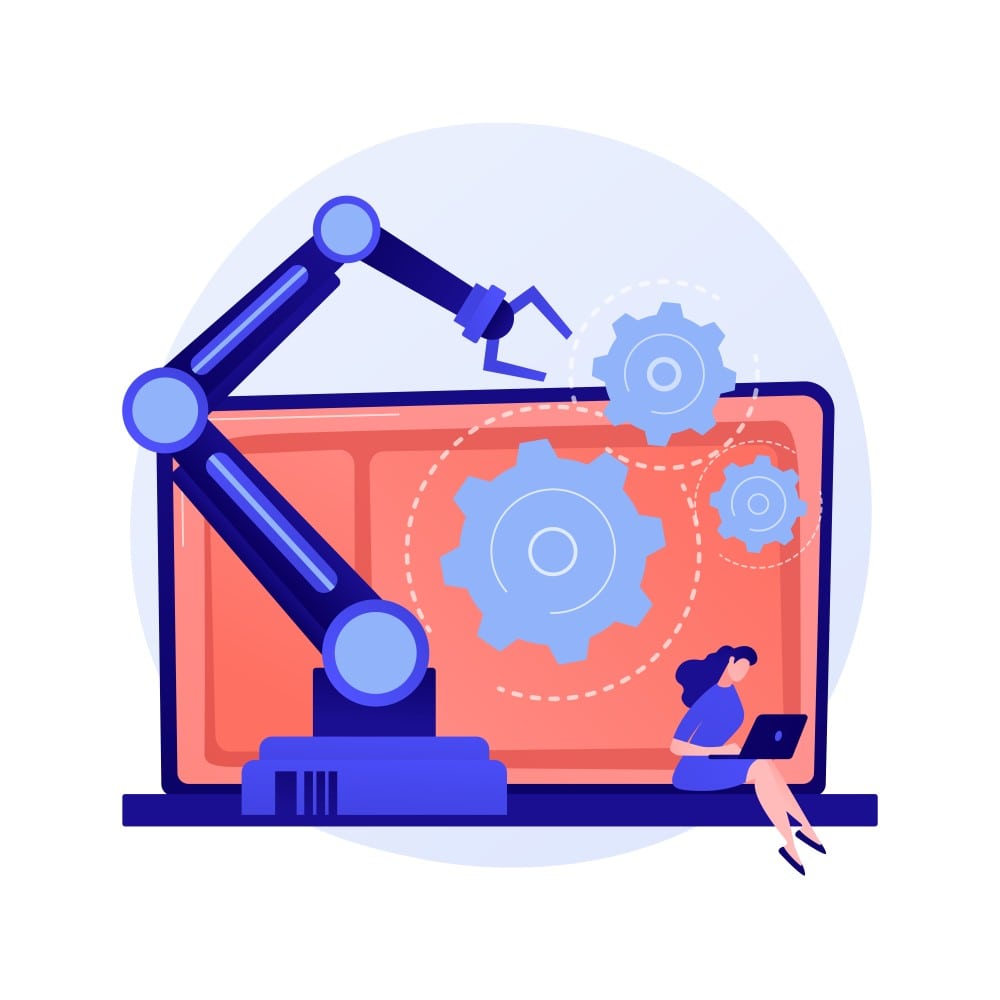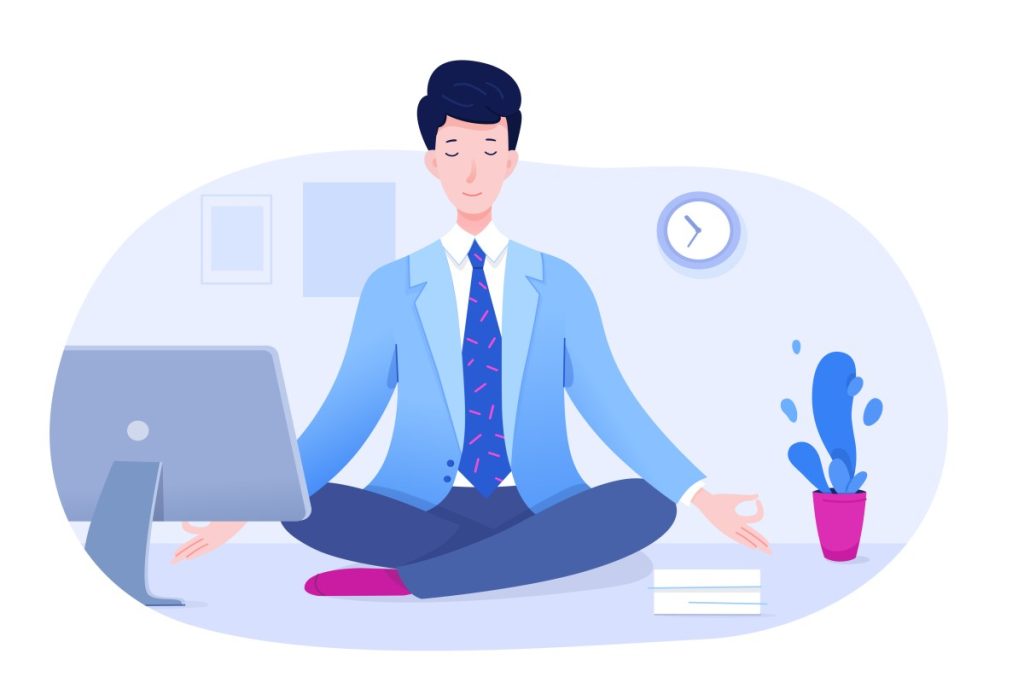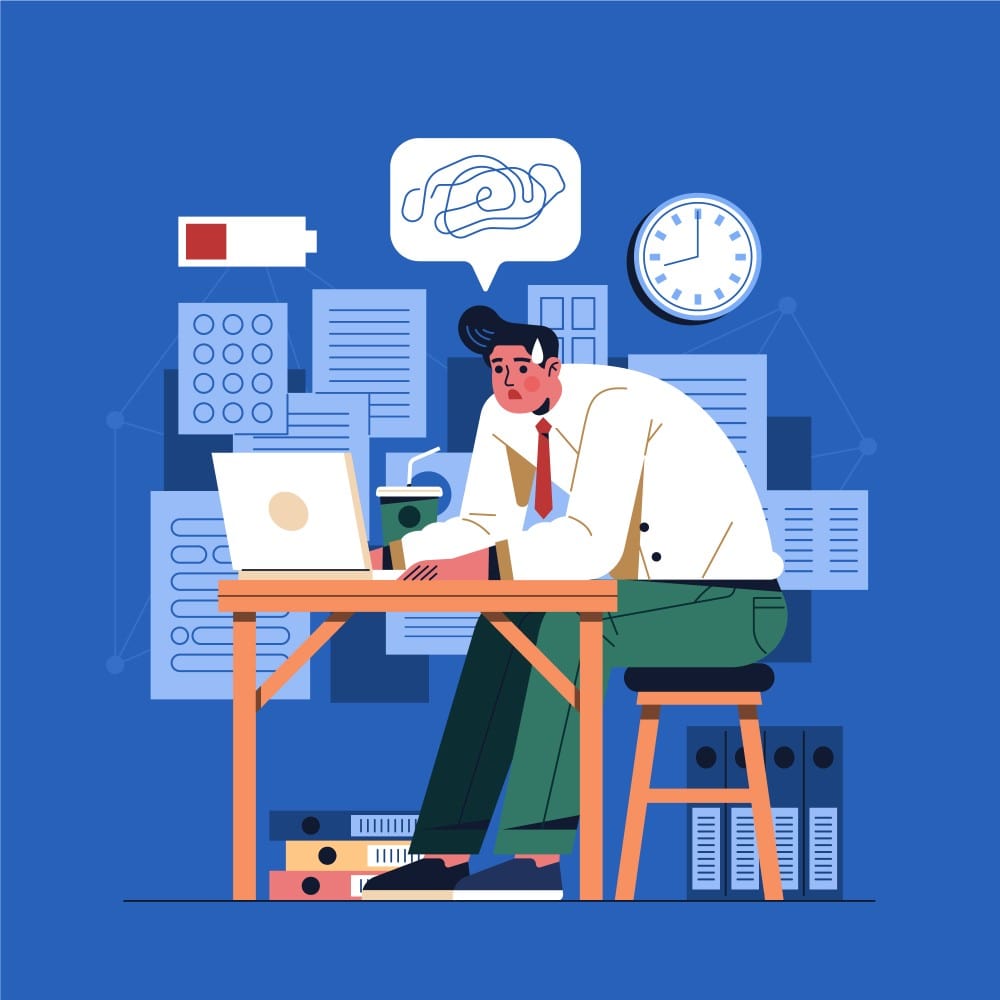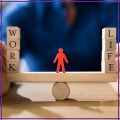Do you regularly feel stressed out at the workplace? Maybe the boss asked you to conduct an interview, a team meeting, and share project updates all at once. Making multiple decisions throughout the day often leaves you mentally and emotionally vulnerable to making bad decisions. The result? You start experiencing what is known as decision fatigue at work.
Unfortunately, this is a painful reality that most workplace managers experience on a day-to-day basis. From planning the day’s work to ensuring that all tasks get delivered by the end of the day, there is a lot on a manager’s plate. In the long run, it causes a drop in workplace productivity and makes it an internal struggle to even go to work.
In short, decision fatigue is not a good thing for you. So, let us see why it is something not to be taken lightly, how it impacts you, and what you can do to avoid it in the first place.
What is Decision Fatigue?
Decision fatigue is a state of mental exhaustion that occurs when you make too many decisions simultaneously. There are many factors that lead to this problem, two of them being physical fatigue, and long-term sleep deprivation.
Apart from this, you might experience decision fatigue at work due to the decision being too complex, and important, making too many decisions simultaneously, time spent in making those decisions, and experiencing high stress in your professional and personal life.
So, If you think that decision fatigue is not a big deal, it is time to change that perspective.
Why is decision fatigue a problem at work?
Not resolving the problem of decision fatigue at work poses a serious risk to your overall well-being. Also, making so many decisions simultaneously drains your mental capacity to make sound decisions, which in the long run makes you more likely to make poor decisions.
Add to that, the constant bombardment of new information that might require your attention makes it difficult to be confident about the decision you are going to make. In the long run, it leads to diminished workplace performance.
Also, not taking care of this issue has long-term repercussions for your overall health too.
Effects of decision fatigue
Decision fatigue can easily impact your mental, emotional, and physical health. Apart from tiredness and inability to make sound decisions, it also increases your risk of developing:
1. Decreased self-control
If you experience decision fatigue at work, it leads to impaired self-regulation in the long run. Everyone has a specific amount of mental energy. Besides helping you make decisions, this mental energy is also expended in maintaining willpower.

So, when this energy becomes low, it starts impacting your level of self-control. As a result, there is a high chance that you would make poor decisions, one of them being impulsive buying.
2. Impulsive decisions
As the day goes on, your ability to make sound and positive decisions start to wane. The more mental energy you spend making decisions, the more your brain starts looking for shortcuts. Shortcuts are often used when there is uncertainty about which decision is the best decision. One of these shortcuts is impulsive decisions, which you make without thinking about the consequences of the decision made.
3. Indecision
Long-term decision fatigue can make it difficult for you to choose the best option when making a decision. So, if you experience decision fatigue, it will be hard for you to come out of the decision-making process itself.
Unfortunately, that is not where the impact of decision fatigue stops. Too much depletion of your mental energy reserves also impact your health. Read further to know what these are.
What are the warning signs of decision fatigue?
Being stressed out, inability to focus, and lack of decision-making skills are some of the signs of decision fatigue. But, these are just a few of the many signs that you or someone you know is suffering from decision fatigue.
Given below are some more tell-tale signs you should look out for:
1. Impulsiveness
Too much decision fatigue has a negative impact on your ability to make the right decisions. This results in decreased self-control and more impulsive decisions.

Have you ever seen one of those YouTube videos where an employee smashes their computer system to pieces? That’s decision fatigue and impulsiveness at their worst.
2. Procrastination
Procrastination is one of the warning signs of decision fatigue at work. It prevents you from taking any decision, good or bad. You get stuck in the process of decision-making and do not reach any.
Let’s assume, your manager tells you to come up with a schedule for a new project. Now, you need to make several important decisions like what resources are required, whom to assign which tasks, and what is the end goal. But, the very idea of you making so many decisions leaves you in a limbo of procrastination.
3. Feeling overwhelmed
The impact that decision fatigue at work can have on your emotional health is not to be taken lightly. Too many decisions and the pressure to make the right choice every time make it difficult to arrive at any decision at all. In the long run, this impacts even simple decision-making like which movie to watch, or what game to play.
4. Saying NO to Everything
At times, you might think that saying no is much easier than comparing the many decisions you have to make and choosing the right one out of them. On the contrary, this is the same as saying an impulsive YES to everything.
Apart from these, the other signs of decision fatigue can include a short temper, physical symptoms like fatigue, poor sleep, upset stomach, headaches, and a general sense of dissatisfaction with any decision made.
The question now is – How can you avoid decision fatigue from occurring in the first place? Let’s find out.
How can you beat decision fatigue at work?
Decision fatigue at work is a painful reality for managers and team leads. But, it does not mean there is no respite from the problem.
Given below are 10 ways you can keep decision fatigue at the workplace from impacting your mental, emotional, and physical well-being.
1. First, identify the problem
The first step to dealing with decision fatigue in the workplace is to identify what is the root cause of the problem. Is it too much work? Are you unclear about what tasks need to be completed on priority and which ones can wait?
Finding the problem will help you look for a solution or ask for some assistance from a senior management employee to resolve the issue.
2. Stop trying to be so perfect
Perfectionism is a bane of modern-day work life, especially when it comes to a project manager or team lead. Every decision you take is expected to be the right one, but trying to do so comes at a huge cost. By trying to make every decision the perfect one, you end up not making any decisions.

Striving for perfectionism is a dangerous game as it impacts not only your professional but personal life as well. So, you should set realistic goals, avoid the comparison game, delegate work, and use automation whenever possible.
Author Jodi Picoult perfectly summarizes the importance of avoiding perfectionism – “You can edit a bad page, but you can’t edit a blank page”.
3. Find a routine and stick to it
Creating a routine in personal life can help deal with decision fatigue at work without hassle. You can start small by choosing the clothes you would wear the night before. It might seem a trivial task but does save you the time and mental energy spent deciding what to wear the next day.
So, as a manager what you can do is create a work schedule the day before, create the tasks, and choose team members to assign the work. With this, you are more likely to make the right decisions in the workplace by focusing on the most important tasks first. You can also try out these task management strategies to make office work less hassle.
4. Invest in automation where possible
Technology is a boon for the modern-day workplace. There is no limit to the number of tools available to help managers and team leaders handle day-to-day work and their teams.
Investing in task management software helps you delegate trivial tasks and focus on the primary ones. These tools help you manage daily work, connect with the team and project stakeholders, and deliver high-priority tasks on time.

5. Batch similar tasks together
One of the best ways you can decrease decision fatigue at work is through task batching. It is a simple yet powerful technique to improve your productivity by grouping similar tasks together and completing all of them at once. Task batching helps avoid multitasking and increases the amount of time required to focus on important tasks.
For example, instead of checking emails as they come, you can choose a designated time to check them out all at once.
To make this easy, you can invest in task management software that helps you group similar tasks together, automate them, and complete them.
6. Define decision-making criteria in advance
The decision-making criteria comprise the values, principles, rules, and conditions an organization follows while making a decision. It also comprises many economic, technical, personal, and social factors that impact a business’s growth and future.
This help improves the rationality and quality of decisions taken by you as a manager or team lead. Thus, it is important that you lay down the decision-making criteria in advance so that all stakeholders and in-house teams can follow them. Doing so will help improve the effectiveness and acceptability of the decisions.
7. Say NO when you are asked to take on more
To avoid the risk of coming across as too confrontational or lazy at the workplace, all of us become the YES man or woman. But, we tend to forget that all of us have a limited amount of mental energy and decision-making power.
The more you say yes to every work request, the poorer the quality of decisions you will make and it will lead to decision fatigue at work. To keep this from happening, you have to start saying no when there is already enough on your plate. But, there is a way of doing it.
- Refuse politely but thank them for the opportunity
- Calmly state your reasons for saying NO
- Ask them which tasks to put aside for the one you are being asked to do
- Offer an alternative solution
8. Regularly schedule quiet thinking time
Having a few quiet hours in the workplace helps you stay away from all the noise of smartphones, emails, and social network updates. Scheduling quiet thinking time into your office schedule does wonders for your mental health as well.

Doing so gives your brain much-needed rest, especially when you are making multiple decisions on a daily basis. It also reduces employee work stress, improves output and employee thinking. Quiet thinking time not only helps you give undivided and focused attention to a task but also reduces the risk of developing decision fatigue at work in the long run.
9. Seek help during difficult times
Do you feel overworked and exhausted in the workplace? Maybe you have been assigned more work than you can handle within a short time period. Spend time analyzing how much help you need, who is the correct person to ask for it, and what tasks you can outsource to others.
If it is an urgent matter, do not delay as the problem might get out of hand and you might be left with fewer options to resolve it. You should create a list of the issues you are facing, work out how long it will take to resolve the issue, and discuss the possible solutions with superiors.
10. Don’t overthink small decisions
Overthinking small decisions often leaves you in a limbo of not being able to make important decisions at work. This taxes up your mental energy and willpower, which are depleted by the time you have to focus on a high-priority task.

To keep this from happening, you need to let go of the idea of making every decision perfectly. Know which tasks, individuals, or goals will be impacted by the decision, and develop creative constraints to bypass the lengthy process of overthinking.
Unfortunately, there is a bit of confusion between decision fatigue at work and indecisiveness. If you are confused between the two, pay attention to the information below.
Is there a difference between decision fatigue and indecisiveness?
Yes! Decision fatigue occurs when your mental energy to make sound decisions starts depleting after making multiple decisions within a specific period of time. On the other hand, indecisiveness can be described as a character trait, which is a result of a chronic inability to make decisions and usually has its roots in low self-confidence.
Moreover, indecisiveness starts pretty early in an individual, but decision fatigue sets in after making a number of decisions without any break. Specifically, someone who is indecisive often does a lot of procrastination, even when it comes to making small decisions. Also, fearful avoidance is the root cause of individuals suffering from chronic indecisiveness. But, decision fatigue can impact anyone, even the ones who do not struggle with making decisions.
There is a solution to both issues, but indecisiveness can take longer and requires more effort from the individual’s side. Fortunately, you can overcome decision fatigue by following a few easy-to-follow tips.
Your office is not the only place plagued by decision fatigue. There are other professionals that too experience decision fatigue at work and it impacts the decisions they take during the day.
So, let’s check out some of the examples where decision fatigue has consequences for the person or issue being decided on.
Decision Fatigue Examples
Example 1 – Parole Hearing
Some prisoners in the justice system are given opportunities for parole throughout their sentences. Parole hearings occur between a judge and the prisoner, and take place randomly throughout the day.
But, owing to decision fatigue, the time of the parole appointment holds an important place and has an impact on the results. So, those with early parole hearings are more than likely to be given parole in comparison to prisoners with afternoon or evening hearings.
The reason? Judges too suffer from decision fatigue and it sets in by the afternoon. This fatigue causes them to go by the default option in parole hearings, which is to deny parole to the other prisoners.
Example 2 – Meal Planning
Nothing seems as stressful as planning what you want to eat every day. It is primarily due to the umpteen number of decisions you have to make. For example, you are planning to make a cheese pizza this Saturday. The dish seems perfect to kickstart the weekend.
So, now you have the list of ingredients to pick from the supermarket. The problem starts when you go to the aisle to purchase processed cheese and are bombarded with 20 or more options from different brands.

After trying to decide on a particular brand, you go back home realizing that you would not be able to enjoy pizza during the weekend. So, the final decision is to cancel the plan.
Key Takeaway
Do you feel agitated and irritable due to too much work? Chances are you are suffering from decision fatigue at work. Identifying the root cause of this problem will go a long way in helping you alleviate the negative consequences. Take note of the decisions you make at the workplace, whether they are big or small. Also, you can try maintaining a balance between working in silence and a little bit of distraction.
FAQs
Is there a bias in decision fatigue?
Yes! You can suffer from cognitive bias in decision fatigue. Making multiple decisions on a daily basis impairs the executive functioning of your brain and influences all future decision-making.
What is the alternative term for decision fatigue?
The alternative term for decision fatigue is ego depletion. It is a phenomenon where your willpower gets impaired due to being used in making too many decisions at one time.
What is Mental Fatigue?
Mental fatigue refers to feelings of brain exhaustion that you experience after a lengthy cognitive performance. It makes it harder to be attentive, perform small tasks, and filter information.
Who is afflicted by decision fatigue?
Decision Fatigue can affect even the most rational and intelligent individuals. However, those who have to make several decisions like managers or team leads are more susceptible to it.




















No Comments